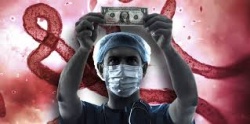Difference between revisions of "Biodefense"
Jump to navigation
Jump to search
(image) |
m (Text replacement - "|WP=https://" to "|wikipedia=https://") |
||
| Line 1: | Line 1: | ||
{{concept | {{concept | ||
| − | | | + | |wikipedia=https://en.wikipedia.org/wiki/Biodefense |
|image=diodefense.jpg | |image=diodefense.jpg | ||
}} | }} | ||
Revision as of 14:00, 26 July 2016
 | |
"From 2001 to 2009, as the U.S. government increased its annual expenditures on biodefense efforts from about $50 million to some $8 billion, [Carol R. Kuntz] played a leading role in shaping many of the new initiatives."[1]
Researchers
Bruce Ivins, a microbiologist, vaccinologist and biodefense researcher at Fort Detrick, was blamed by the FBI for the 2001 anthrax attacks.[2]
Related Quotation
| Page | Quote | Author | Date |
|---|---|---|---|
| Biological weapon | “Fabricating scary narratives about superbugs is much easier than delivering on promises of making those bugs in labs. This is also a very productive avenue as people are woefully gullible and thus can be controlled by narratives just as effectively as by an actual scary-scary bioengineered virus. Biodefense is a huge grift on both sides. 'Their' side appropriates money and power, and new billion dollar agencies for 'Pandemic Preparedness'. 'Our' side gets millions of followers talking about them evil guys, or spinning stories about biolabs in Wuhan, Ukraine and lately California. They leak' from labs almost every week, and using CRISPER gene drive narrative logic, all mice in the world should look like Ralph Baric by now.” | Sasha Latypova | November 2023 |
Many thanks to our Patrons who cover ~2/3 of our hosting bill. Please join them if you can.